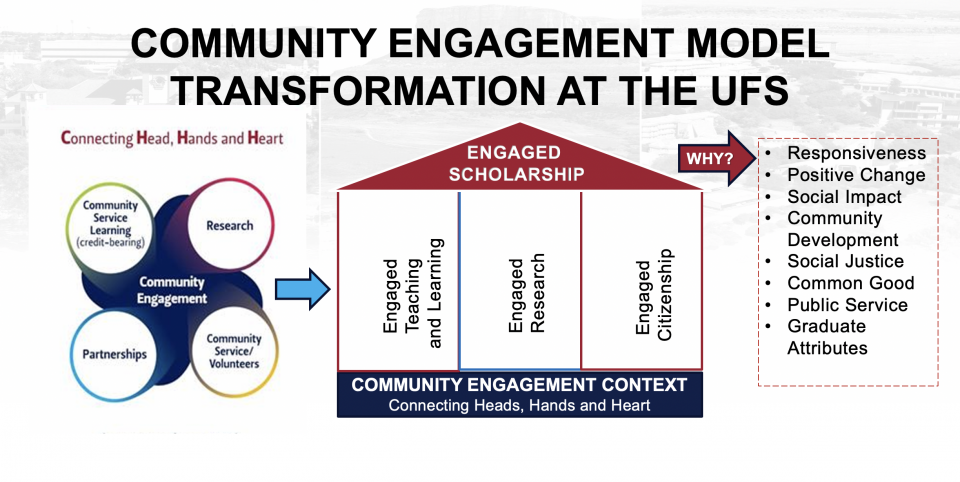First Column
EiJ Concept: Engaged Scholarship
Contributors
Related Article: ENGAGED SCHOLARSHIP FOR ENVIRONMENTAL JUSTICE
This guide by Chad Raphael from Santa Clara University goes extremely in depth in how ES should be conducted. It also gives excellent examples of how ES has been used in real world situations.
Guide Link: ES-For-EJ-Guide-Final.pdf (scu.edu)
Community Engagement Model

Image shows the process of Engaged Scholarship and the goals it sets.
Photo Citation: “Engaged Scholarship.” n.d. Www.ufs.ac.za. Accessed February 9, 2022. https://www.ufs.ac.za/supportservices/departments/community-engagement-h... .
Second Column
Engaged Scholarship Definition, Applications, and Goals
Engaged Scholarship (ES) describes the actions that academic institutions take to further involve researched communities into their research. Building bridges of trust and communication with designated community partners is vital to conducting well rounded research. This inclusion proves to be beneficial to both researchers and community partners. Community partners are able to provide critical insight about their communities to researchers. In turn the researchers are able to more effectively help studied communities and provide valuable assistance in solving real world problems. Research that utilizes ES will have bigger social impacts and will help ensure no negative research occurs. Such negative research that may only be conducted to exploit studied communities to the benefit of academic goals.
Third Column
ES For EJ Guide Excerpt
“Foremost is the civic expert, who understands the need to enrich technical understanding with other forms of knowledge (including local, experiential, tacit, and indigenous understandings), and to share power over choices with the public, to arrive at better informed and more socially acceptable decisions (see also Stilgoe, Irwin, & Jones, 2006).” (Raphael, 2019).
Raphael, Chad. 2019. “Engaged Scholarship For Environmental Justice”. Santa Clara University. May.
Video on Engaged Scholarship's Applications and How it is Useful
Link: (2) Community engaged Scholarship at the teaching-service-research nexus - YouTube
This video from Concordia University shows an interview with Dr. Tanya Brann-Barrett and asks the doctor a few questions on Engaged Scholarship. Dr. Brann explains how Engaged Scholarship can be brought to communities and how it is useful both researchers and community members.
